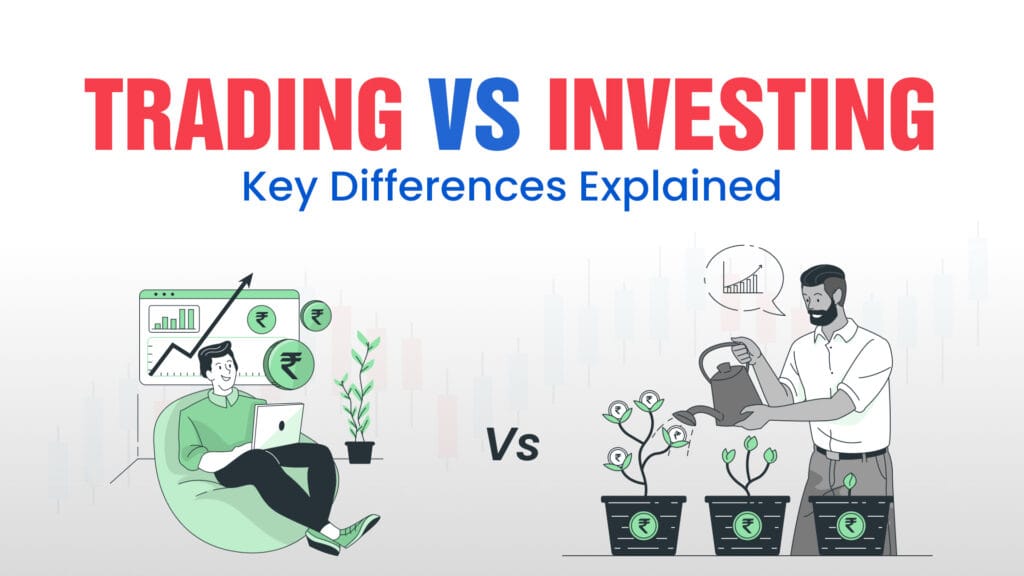
Trading vs Investing Explained
When we talk about generating income in the stock market, two popular methods are in vogue: trading and investing. On the surface, they might appear to be the same thing-after all, both involve the purchase and sale of stocks or other investments. Yet the tactics, objectives, and timelines are quite different. Knowing the difference between trading and investing is paramount if you wish to select the appropriate method for your financial journey.
This article deconstructs the main differences between stock investing and stock trading, so you can make an informed decision as to which one fits your goals, lifestyle, and risk tolerance better.
What is Investing?
Investing refers to the act of purchasing assets like stocks, bonds, mutual funds, or ETFs with a long-term holding strategy. Investors typically concentrate on accumulating wealth over time, based on the power of compounding, dividends, and business growth.
The strategy is not to pursue quick gains but to allow money to work for you in the long term. Investors consider a company’s fundamentals-business model, financials, market opportunity, and management-prior to investing in shares.
✅ Timeframe: Years or decades
✅ Goal: Creating wealth in the long term
✅ Strategy: Buy-and-hold, diversification, fundamental analysis
✅ Example: Investing in shares of Infosys or Reliance and holding them for 10+ years
Trading is generally riskier than investing, particularly if diversified across sectors and asset classes. But it demands discipline and patience to ride out short-term market vagaries.
What is Trading?
Trading, in contrast, involves profiting from temporary market movements. Traders continuously purchase and sell stocks, commodities, currencies, or derivatives over days, weeks, or even minutes. In contrast to company fundamentals, traders use technical analysis, trends, and charts of prices to their advantage.
Trading is intended to make profits quickly based on minor price movements. This, however, involves greater risk, as prices may shift erratically.
✅ Duration: Seconds, hours, days, or months
✅ Objective: Quick gains
✅ Technique: Technical analysis, market timing, active trading
✅ Example: Purchasing NIFTY options in the morning and selling the same day for profit
Trading can be profitable, but it requires time, attention, and experience. Without risk management and discipline, traders may incur huge losses.
Key Differences Between Trading and Investing
Here’s a quick comparison to clearly understand the trading vs investing difference:
| Factor | Trading | Investing |
|---|---|---|
| Time Horizon | Short-term (minutes to months) | Long-term (years to decades) |
| Objective | Quick profits | Steady wealth creation |
| Risk | High, due to volatility | Moderate to low (with diversification) |
| Analysis Used | Technical charts & price action | Fundamental analysis & company value |
| Approach | Active participation | Passive wealth-building |
| Returns | Can be quick but inconsistent | Slow but more consistent over time |
Both trading and investing involve risks, but the nature of the risks are different:
Trading Risks:
Market volatility can cause deep losses.
Emotional decision-making tends to get the trader out too soon or in too long.
Needs strict stop-loss rules.
Investment Risks:
Market downturns will temporarily impact portfolio value.
Returns are slower, thus patience is needed.
Needs keeping up with company performance.
Knowing these risks will assist you in choosing which method better suits your financial personality.
Which is Better: Trading or Investing?
It depends on your objectives, risk tolerance, and lifestyle:
If you want long-term stability, less stress, and slow accumulation of wealth, then investing is a better option.
If you like chart analysis, fast decision-making, and can manage risk, then trading is for you.
Most successful people actually do both methods-investing a part of their capital in the long term while employing another portion for short-term trade.
Final Thoughts
Comparing investing vs trading, it’s evident that both have their own strengths and weaknesses. Trading is able to make fast money but takes time, expertise, and risk. Investing, as a contrast, is about stability and long-term wealth generation through patience and compounding.
Ultimately, it all comes down to your goals, personality, and how much time you are willing to spend on the markets.
Interested in learning more? Check out our in-depth guide on Stock Trading vs Investing
to make wiser investment choices.
Visit The Safe Trader Academy today to explore our comprehensive training programs. Start building your skills, apply proven swing trading strategies, and become part of a supportive trading community that’s committed to your success.
